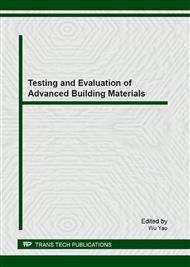p.10
p.14
p.19
p.25
p.30
p.35
p.40
p.44
p.49
Study on the Hydration Kinetics of Portland Cement
Abstract:
A kinetic model originally developed by Tomosawa is analyzed for the hydration of Portland cement. The complicated kinetic equation of Tomosawa model is transformed into three simple equations of simplified model which represent mass transfer, phase-boundary reaction and diffusion process at different stage, respectively. Based on the isothermal calorimetry and the simplified model, the relationship between the degree of reaction and reaction rate is discussed. The derived result could reflect the development of degree of reaction and reaction rate during the cement hydration. The calculation results of simplified model are compared well with the experimental results. Studying the connection among the three processes is helpful to understanding the complicated hydration mechanism of Portland cement.
Info:
Periodical:
Pages:
30-34
DOI:
Citation:
Online since:
January 2013
Authors:
Keywords:
Price:
Сopyright:
© 2013 Trans Tech Publications Ltd. All Rights Reserved
Share:
Citation:


